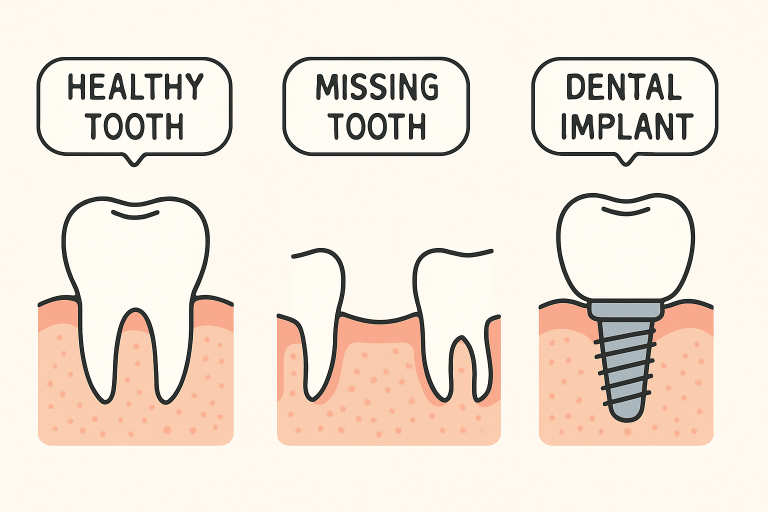Health and Wellness
Permanent Solutions for Missing Teeth
Key Takeaways
- Missing teeth not only affect appearance but also overall oral health and function.
- Dental implants, including All-on-4 implants, offer lasting and natural-feeling solutions.
- Innovations like smart dental implants and bioengineered teeth promise a transformative future.
- Consulting with a dental expert is crucial when selecting the most suitable treatment.
Understanding the Impact of Missing Teeth
Missing teeth create challenges that extend far beyond a visible gap in your smile. Many people report changes in speech, difficulty eating, and a reduction in self-confidence. The absence of even a single tooth can influence the alignment of your remaining teeth, gradually leading to bite issues or jaw discomfort.
Untreated tooth loss may also lead to long-term oral health consequences. The jawbone, in the absence of stimulation from tooth roots, can begin to deteriorate—a process known as bone resorption. Besides compromising facial structure, this deterioration can complicate future restoration attempts. For those seeking a comprehensive remedy, full mouth dental implants Madison,MS offer a modern and lasting solution.
Early intervention plays a critical role in minimizing these risks. Replacement options that provide functional and aesthetic restoration, such as dental implants or fixed bridges, prevent teeth from drifting and help preserve both bone and tissue health. Maintaining oral health through preventative measures and timely replacement is essential for long-term function and comfort. Social and psychological impacts can be just as significant as the physical consequences.
Dental Implants: A Gold Standard
Dental implants are recognized as the most reliable solution for missing teeth due to their unmatched ability to replicate natural function and appearance. The process involves placing a biocompatible titanium post into the jawbone, followed by the attachment of an artificial crown that matches the surrounding teeth. As the implant fuses with the bone, it provides robust support and prevents the bone loss associated with missing teeth.
Benefits and Advancements
One significant advantage of dental implants is their durability. With proper care, implants can last decades and require no special maintenance beyond normal brushing and flossing. Recent advancements have expanded options for patients with metal allergies, as ceramic implants are now available, offering a hypoallergenic and aesthetically pleasing choice. Both traditional and metal-free implants are highly effective, with exceptional success rates.

All-on-4 Implants: Full Arch Restoration
For those missing an entire arch of teeth, the All-on-4 dental implant technique presents a revolutionary solution. This approach utilizes four strategically placed implants to anchor a complete prosthetic arch, providing stability and immediate function. The All-on-4 method is less invasive than placing individual implants for each missing tooth and is more cost-effective, as it often eliminates the need for bone grafting procedures.
The minimally invasive nature of All-on-4 allows patients to regain the look and function of natural teeth quickly, often on the same day as surgery. Enhanced comfort and a short recovery period make this a preferred option for patients seeking a dramatic smile transformation and reliable long-term results.
Innovations in Dental Technology
Emerging technologies are rapidly advancing the field of dental restorations. Among the most significant developments are “smart” dental implants, which offer sensory feedback to mimic the real-time functionality of natural teeth. According to recent research highlighted by Scientific American, some prototypes may even help detect oral health issues before symptoms arise, improving patient outcomes.
These innovations not only enhance the physical integration of implants but also improve the patient experience. Additive manufacturing, also known as 3D printing, now enables the creation of precise, patient-specific restorations that enhance both comfort and aesthetic appearance. As adoption of these technologies grows, the future of tooth replacement is becoming increasingly tailored, comfortable, and functional.
Bioengineered Teeth: The Future of Dentistry
The next frontier in dental restoration is bioengineering genuine tooth structures. Researchers have taken remarkable steps toward regenerating living teeth through advancements in stem cell therapy and tissue engineering. Groundbreaking experiments have involved the growth of human-like teeth in animal hosts using a blend of human and animal cells.
This promising technique has the potential to eliminate the need for artificial implants. If future research supports the safe and reliable application of bioengineered teeth in humans, they could significantly alter the landscape of restorative dentistry. This approach would enable the full regeneration of lost teeth, complete with roots and vital tissues, for a truly natural result.
Choosing the Right Solution
No single tooth replacement method is ideal for every patient. Factors such as the number of missing teeth, bone density, oral health history, and desired outcome all influence the decision-making process. Comprehensive dental evaluations, imaging, and patient preferences guide dentists in creating individualized treatment plans. Prioritizing a solution that balances function, durability, and aesthetics ensures the best result for long-term oral health and satisfaction.
Conclusion
The advancements in dental restorations provide today’s patients with effective, lasting, and increasingly natural solutions for missing teeth. From traditional dental implants to more complex All-on-4 systems and emerging bioengineered alternatives, numerous options are available for restoring your smile and confidence. By staying informed of available options and working closely with a qualified dental team, you can select the permanent tooth replacement that best suits your unique needs and supports a lifetime of healthy smiles.

